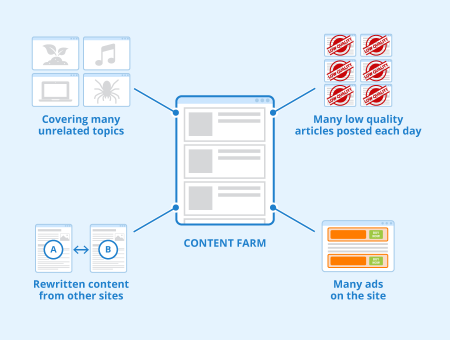What is a content farm?

A content farm is a website that publishes large quantities of low-quality, often rewritten content in a bid to drive as much search engine traffic to their site as possible. Content farms generate revenue through ads on their site, which often requires writers to work at exceptionally low rates in order to produce a profit.
How a content farm works
A content farm works by producing a large volume of content on a range of different topics. Since they create lots of pages, which are optimized during the writing process, content farms tend to rank for a large number of keywords. Although there are content farms that focus on a specific industry or niche, many publish articles on a broad range of topics. These articles are usually produced by freelancers, but they can also use aggregated content from other sites. There have been a lot of claims that content farms pay freelancers very low rates for the content to ensure it is profitable.
Content farms monetize their websites using ads. This results in them needing a high number of website visitors to earn a good return on their investment. Content farms used to perform extremely well on search engines, which led to a lot of clutter and near-identical articles ranking. However, back in February of 2011, Google announced [1] they had made changes to their algorithm to increase the number of high-quality search results. This algorithm update had a large impact on content farms, causing their rankings to drop and many of them losing a large portion of their website traffic.
When is a site considered a content farm?
When exactly a website is considered a content farm is something not everyone agrees on. However, there are a few important things that indicate a website might be a content farm. Some of these are:
- A broad website covering many different, unrelated topics
- Many short, low-quality articles posted each day
- Much of the content is rewritten content that can already be read on other sites
- Many ads on the site, often without a clear separation between the content and the ads
The difference between scraper sites and content farms
Scraper sites are websites that automatically scrape and post content from other websites. These sites directly copy the content using software, without rewriting it in any way. The main difference between these sites and content farms is that content farms rewrite the posts before publishing, or just create low-quality articles that aren’t copied directly. Scraper sites copy the content exactly and post it on their site.
The legal & ethical concerns regarding content farms
Many critics have raised both legal and ethical concerns regarding content farms over the past ten to fifteen years. Since content farms often pay very little for the content they post, many people argue that content farms underpay their freelance writers. Another ethical concern is that of rewriting existing content, which is seen as a form of plagiarism by some critics. Low pay and tight deadlines also lead to writers with no knowledge of/experience in a topic writing posts without properly checking the facts, resulting in the spread of fake news, and wrong information.
Legal concerns have also been raised, especially in cases where content was very similar to other content on the web. It is debated whether the content provided by content farms is considered general knowledge, or whether it is someone’s intellectual property.
Importance for SEO
Content farms used to be very good at ranking on search engines, which caused problems for SEOs and webmasters. Today, they’re mostly seen as spam by search engines and this problem is far less of a concern. However, there are some important lessons to be learned when looking back at their history. With search engines constantly trying to improve their search results, the importance of unique, engaging, high-quality content is even more apparent and has become an important part of SEO over the past few years.
References
- ↑ Finding more high-quality sites in search Googleblog. Retrieved 18 January 2021.
Related links
- https://searchengineland.com/google-forecloses-on-content-farms-with-farmer-algorithm-update-66071
- https://www.makealivingwriting.com/writers-stories-content-farm/
Similar articles
